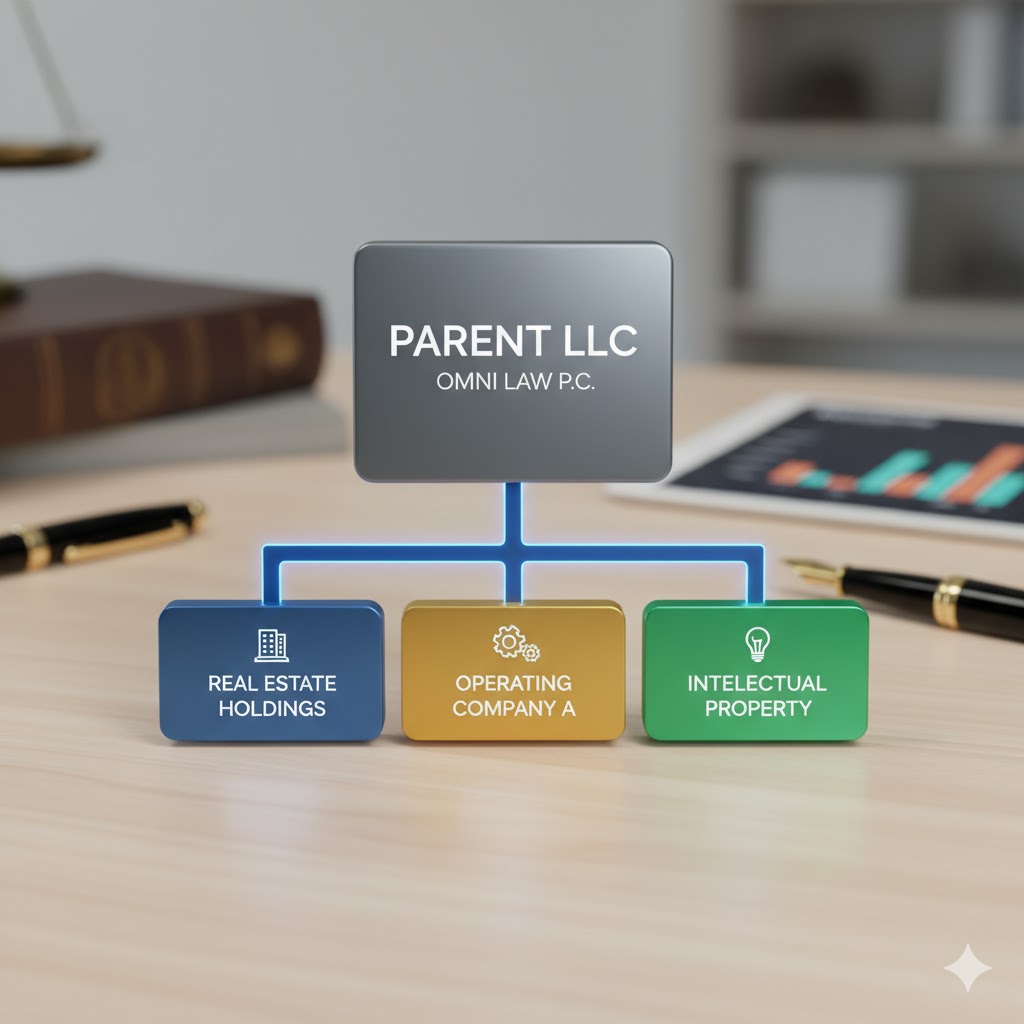The Power of an LLC Owning Another LLC
Starting a business always begins with a foundational, critical decision: choosing the right legal entity structure. For most entrepreneurs, the Limited Liability Company (LLC) is ideal, offering a mix of liability protection and simplicity.
But what happens when your business booms and starts acquiring significant assets? A single LLC might no longer cut it. This leads to a sophisticated question many growing companies deal with: Can one LLC actually own another? The short answer is a definitive yes.
This business setup is called a parent-subsidiary structure. Think of it like a family. The Parent LLC is the main, controlling company—it owns and acts as the only member of the smaller, newly created Subsidiary LLCs. This arrangement isn’t a mere loophole; it’s a smart risk management strategy that organizes your ventures under one umbrella while keeping their liabilities strictly separate.
What Makes the LLC an Excellent Foundation?
An LLC is essentially a flexible business entity recognized by the state. Its greatest benefit is the protective shield it grants its owners, known as members. Like a corporation, an LLC protects the members’ personal assets from the company’s debts and obligations.
It also enjoys the benefit of pass-through taxation, similar to a partnership. This means the company’s profits and losses are reported directly on the members’ personal tax returns, allowing you to avoid the “double taxation” that often hits C-corporations.
To get started, members file Articles of Organization with the state and draft an essential Operating Agreement that defines management roles, member responsibilities, and decision-making rules.
The Power of a Parent-Subsidiary Structure
Structuring your business so one LLC owns its subsidiaries provides several advantages, most of which center on isolating risk / clarity.
- Enhanced Liability Isolation: This is the core benefit. By keeping distinct business ventures or high-value assets in separate subsidiary LLCs, you build a legal wall around each one. If a subsidiary faces a major lawsuit or goes bankrupt, its liability is typically contained to its own assets, shielding the parent company and all other subsidiaries. This is vital for real estate holdings or companies in high-risk industries.
- Targeted Asset Protection: You can place specific, valuable assets like intellectual property, specialized equipment, or key real estate into their own subsidiary LLCs (often called holding companies).
- Operational Autonomy: The parent LLC holds ultimate control, but each subsidiary can be set up with its own management team, employees, and specific operating agreement. This enables decentralized, specialized management of different business lines or properties, while the parent can focus on the big-picture strategy.
- Simplified Ownership and Investment: Consolidating overall control under a single parent LLC can simplify the structure for the founders. Plus, if you want to bring in outside investors, you could offer them a stake in one high-growth subsidiary without giving them a claim on the entire corporate umbrella.
Navigating the Challenges and Complexities
While beneficial, this multi-entity structure adds administrative and legal hurdles that demand meticulous attention. The most common challenge is the strict requirement for separate corporate formalities. For instance, if the parent LLC uses its funds to regularly pay the subsidiary’s bills, a court could later view them as a single entity, allowing a creditor to “pierce the corporate veil” and sue the parent.
Administratively, each subsidiary must hold its own annual meetings and keep its own minute book separate from the parent’s, a detail often overlooked by small business owners.
Increased Administrative Load
The sheer number of entities requires a rigorous commitment to compliance. Each LLC must:
- Maintain its own separate books and financial records.
- Secure its own Employer Identification Number (EIN).
- Have distinct business bank accounts.
- File its own annual reports and fees with the state.
- Strictly comply with its Operating Agreement.
***Crucial Note: Failing to maintain this separation could expose the parent and all other subsidiaries to the liability of a single subsidiary.
Complex Tax Implications
The parent subsidiary structure can complicate tax filings. A single member subsidiary 100% owned by the parent is often treated as a “disregarded entity” for federal tax purposes; its income and expenses are simply reported on the parent’s tax return. As the structure grows and if ownership percentages vary, tax strategies can quickly become intricate, requiring careful planning to avoid pitfalls.
This intricacy deepens if a subsidiary has multiple members which would typically require the subsidiary to file its own separate IRS Form 1065 (Partnership Return), rather than being disregarded.
Higher Costs
Simply put, you’ll have more fees. Each LLC requires its own initial filing fee, annual renewal fees, and potentially separate registered agent costs. The necessity of specialized legal and accounting services to correctly set up and maintain the structure also adds to the overall expense.
Conclusion: The Necessity of Expert Guidance
The decision to utilize an LLC to own one or more subsidiary LLCs is a powerful, strategic move for scaling businesses and sophisticated investors. It provides an unmatched level of asset and liability protection by segmenting risk, but it is not a passive solution. The benefits hinge entirely on the meticulous, ongoing adherence to legal formalities and a sophisticated understanding of the tax landscape.
At Omni Law P.C., we specialize in developing and implementing robust business structures that align with your specific growth and risk mitigation goals. Don’t navigate the complexities of multi-entity ownership alone. Check out our LLC Formation Checklist to ensure you have everything to need to start a new business.
Contact us today to ensure your parent-subsidiary LLC structure is established correctly and maintained diligently for long-term success and peace of mind.
